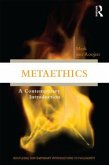According to noncognitivists, when we say that stealing is wrong, what we are doing is more like venting our feelings about stealing or encouraging one another not to steal, than like stating facts about morality. These ideas challenge the core not only of much thinking about morality and metaethics, but also of much philosophical thought about language and meaning.
Noncognitivism in Ethics is an outstanding introduction to these theories, ranging from their early history through the latest contemporary developments. Beginning with a general introduction to metaethics, Mark Schroeder introduces and assesses three principal kinds of noncognitivist theory: the speech-act theories of Ayer, Stevenson, and Hare; the expressivist theories of Blackburn and Gibbard; and hybrid theories. He pays particular attention both to the philosophical problems about what moral facts could be about or how they could matter, which noncognitivism seeks to solve, and to the deep problems that it faces, including the task of explaining both the nature of moral thought and the complexity of moral attitudes, and the 'Frege-Geach' problem.
This second edition has been revised and updated throughout. It includes new sections on whether expressivism is a metasemantic thesis; the rise of relational expressivism; the idea that expressivism leads us to a novel understanding of the nature of propositions; and expressivism and epistemic modals, deontic modals, probability, and truth.
Schroeder makes even the most difficult material accessible by offering crucial background along the way. Also included are exercises at the end of each chapter, chapter summaries, and a glossary of technical terms, making Noncognitivism in Ethics essential reading for all students of ethics and metaethics.
Noncognitivism in Ethics is an outstanding introduction to these theories, ranging from their early history through the latest contemporary developments. Beginning with a general introduction to metaethics, Mark Schroeder introduces and assesses three principal kinds of noncognitivist theory: the speech-act theories of Ayer, Stevenson, and Hare; the expressivist theories of Blackburn and Gibbard; and hybrid theories. He pays particular attention both to the philosophical problems about what moral facts could be about or how they could matter, which noncognitivism seeks to solve, and to the deep problems that it faces, including the task of explaining both the nature of moral thought and the complexity of moral attitudes, and the 'Frege-Geach' problem.
This second edition has been revised and updated throughout. It includes new sections on whether expressivism is a metasemantic thesis; the rise of relational expressivism; the idea that expressivism leads us to a novel understanding of the nature of propositions; and expressivism and epistemic modals, deontic modals, probability, and truth.
Schroeder makes even the most difficult material accessible by offering crucial background along the way. Also included are exercises at the end of each chapter, chapter summaries, and a glossary of technical terms, making Noncognitivism in Ethics essential reading for all students of ethics and metaethics.
Praise for the first edition:
'Noncognitivism in Ethics is the best introduction to noncognitivism and to the complex philosophical issues it generates that I have seen. It is written with teaching in mind. While the discussion is advanced enough to maintain the interest of even a professional reader, it presupposes very little. Schroeder always takes care to explain the point of any philosophical technique that might otherwise put off newcomers.' - Mark van Roojen, University of Nebraska - Lincoln, USA
'Noncognitivism in Ethics combines sparkling clear presentation and balanced critical assessment with extremely thoughtful and well-crafted sets of exercises that accompany each chapter. This is an ideal book for undergraduates beginning serious study of metaethics, while the more advanced exercises and masterful overview of the challenges confronting noncognitivist views also make this a perfect text for graduate seminars.' - Mark Timmons, University of Arizona, USA
'Noncognitivism in Ethics is the best introduction to noncognitivism and to the complex philosophical issues it generates that I have seen. It is written with teaching in mind. While the discussion is advanced enough to maintain the interest of even a professional reader, it presupposes very little. Schroeder always takes care to explain the point of any philosophical technique that might otherwise put off newcomers.' - Mark van Roojen, University of Nebraska - Lincoln, USA
'Noncognitivism in Ethics combines sparkling clear presentation and balanced critical assessment with extremely thoughtful and well-crafted sets of exercises that accompany each chapter. This is an ideal book for undergraduates beginning serious study of metaethics, while the more advanced exercises and masterful overview of the challenges confronting noncognitivist views also make this a perfect text for graduate seminars.' - Mark Timmons, University of Arizona, USA








